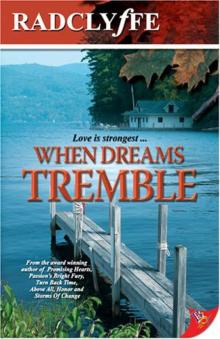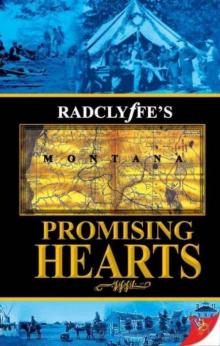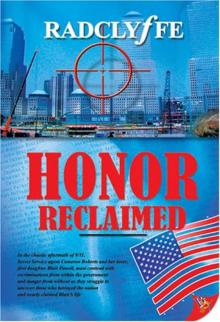Homestead Read online
Page 2
“Should I go?” Charlotte mouthed silently. Her full curves that had fit so well against Clay’s more angular, taller body looked very inviting outlined beneath the sheet.
“No. Stay,” Clay said in a normal voice. She would have liked to keep some things about her personal life private, but she’d long ago given up that pipe dream. Nothing about her life had been private since the day she was born. Being the sole heir to a dynasty tended to place her more into the category of commodity than person, even to those closest to her. She took the phone and sat down on the side of the bed next to Charlotte. “Good morning, Millie.”
“I’m glad I caught you,” her father’s executive assistant said without the slightest hint of sarcasm or criticism. Despite her willingness to take Clay to task for her peccadillos, Millie had been one of the few people who had unflinchingly supported Clay through rumor, accusation, and scandal. Her father had not so much supported her as handled the problem, and she wasn’t sure to this day if he’d cared about her side of things or not. She wasn’t even sure he’d believed her explanation.
Clay shook off the past with an irritated shrug. The past was the past, and none of that mattered any longer. “What’s the emergency?”
“I’m afraid your travel plans have been changed.”
“What this time?” Clay tucked the phone between her ear and her shoulder and slid her hand under the sheet onto Charlotte’s smooth thigh. Charlotte wasn’t due to fly out until the afternoon and neither was she. Her morning plans had been no more complicated than room service, breakfast in bed, and more of Charlotte. She eased her fingertips over the firm curve of Charlotte’s thigh onto the creamy, soft skin high up on the inside of her leg. Charlotte made a humming sound of pleasure and pressed her hand over Clay’s through the sheet.
Charlotte’s hand was smooth and feminine, with tapering fingers and manicured nails painted a pale pink. Clay pictured her own hands, as much like her father’s as her thick dark-brown hair, chestnut-brown eyes, and muscular build—strong broad fingers, slightly calloused at the tips, moving now over Charlotte’s tender flesh. The image made Clay want to earn her reputation as a ruthless corporate pirate and plunderer. She grinned at Charlotte. “One minute.”
Charlotte regarded her from beneath half-lowered lids, her dark eyes smoky with invitation. “Hurry.”
Clay’s clit tightened. “I’m kind of busy right now, Millie. I’ll call you when I get to—”
“You’re not going to Kansas City. We need you in the Hudson Valley.”
Clay stiffened. She understood the we to mean her father, since it wasn’t unusual for him to decide he needed to pull her from one job to another at a moment’s notice. She wasn’t just the vice president for operations of her father’s many enterprises, she was his general all-around troubleshooter. If a job was going bad, he sent her to find out why and to fix it. If that meant cutting political deals to find ways around problematic zoning regulations or strong-arming subcontractors to keep on deadline, she did it. She was used to the nomadic lifestyle and no longer fought the reality that her life was never really her own. She’d never been bothered by being unpopular. She’d never really wanted friends—not the ones she’d grown up with, who were more impressed by status than substance.
Usually her destination barely registered—one hotel, one drilling field, was pretty much like every other. The corporate jet would take her wherever she needed to go. But the one place she did not want to go was the Hudson Valley. “Where’s Ali? The Johnsonville project is his baby.”
“Alejandro is in Switzerland, overseeing the shipping deal. And this isn’t really his thing anyhow. Robert wants to break ground. We’re already moving in the crews.”
“Then send—”
“Roberta,” Millie said, one of the only people who ever called her by her given name—her father’s namesake—and only then when Millie was making an unassailable point. “Your father wants you in the Hudson Valley. There’s been a change in the county regs, and the window of time may be small for us to establish our presence.”
“So he wants me to get the rigs in and make it more expensive to get rid of us than to—”
“I don’t believe a discussion of business strategy is warranted given the circumstances,” Millie said coolly, as if she had X-ray vision to go along with her nerves of steel.
Of course, maybe she really could see where Clay’s hand had wandered.
“Fine,” Clay said, biting off the word and restraining herself from taking out her anger on Millie, a messenger she did not want to kill no matter how unpleasant her missive. “When?”
Millie laughed softly. “Now that’s a silly question. The jet’s fueling now and Ella is overseeing the arrangements. How about an hour and a half?”
“Ninety minutes? That’s a little—”
Charlotte moved Clay’s hand higher and pressed it to the V between her thighs. She was warm and wet, and a muscle in Clay’s belly twitched.
“Tell them two hours.” Clay disconnected and tossed the phone onto a nearby chair. She drew the sheet down, dropped the towel on the floor, and stretched out on top of Charlotte. Her five-ten frame covered Charlotte’s completely. Charlotte’s breasts were full and firm against hers. The muscles in her chest, honed from working in the field whenever she could, tensed as she gripped Charlotte’s wrists, pinning her lightly to the bed.
Charlotte licked water droplets from her neck. “You’re still wet.”
Clay kissed her and settled her hips between Charlotte’s thighs. “I was about to say—”
“If you’ve only got two hours, don’t say anything.” Charlotte wrapped her legs around Clay’s hips and nibbled on her lip. “Just fuck me.”
Clay rarely took orders, but when a beautiful woman in bed gave instructions, she didn’t argue. Charlotte didn’t seem to notice when her mind drifted to the upcoming trip and a place she’d hoped never to see again.
Chapter Two
Hands tucked into the front pockets of her jeans, Tess stood in the shade of the main cow barn as the last of the milk was pumped from her holding tanks into the transport tanker that idled in front of the wide-open double doors. Just after six, the last major chore of the day was finished. The heat was unrelenting, she’d been up since four, and she was tired of worrying and feeling helpless. Shaking off the fatigue, she waited patiently while the driver disconnected his hoses, checked gauges to measure the volume of milk he’d added to that already on board, and closed the ports on the refrigerated truck’s body. He finished his tabulations, including the milk temperature, spot bacteria count, and overall milk quality, and handed her the form to review. After she initialed the tube of milk he’d taken from her lot to be tested later and handed it to him, she took the clipboard from him, scanned what he had entered, and signed off on the delivery receipt. He gave her a copy, tucked the clipboard under his arm, and glanced out over the pastures. The grass was grazed down to almost nothing. “Sure could stand a little rain, huh?”
“Sure couldn’t hurt,” Tess said, amazed how an understatement could become the mantra of an entire region. The milk yield had been down for the last few days. When the cows didn’t graze, they didn’t make as much milk. Things weren’t serious yet, but they would be if they went much longer without rain. Unlike some of her neighboring dairy farms who weren’t organic, she couldn’t supplement her feed with anything hormonal or chemical to bolster milk production even if the substance was technically approved, not if she wanted to maintain her organic dairy certification. And she needed that to close the deal with Empire Yogurt—the next stage in her plan to make her farm into a solid, profitable operation for the long term.
Greek yogurt was the key to her success. The demand for organic Greek yogurt was skyrocketing, and the consumption of milk in the production of the higher-milk-content yogurt was enormous. Yogurt plants needed more milk than local dairies could supply, and Rolling Hills Farm—her farm—would be one of the few organic dairy farms in the
state. She was in the right place at the right time to build a long-term relationship with the specialty yogurt producers. She was almost at the end of the first year of her five-year plan. In just a few more months, she would meet the state requirements for organic certification, and as soon as she had that, the deal with Empire Yogurt was waiting to be inked. She just had to hang on until then.
“It’s the un-perfect storm, huh?” Tess said. “Mild winter, warm spring, and not enough rain. Water table’s about tapped out.”
“Well,” the driver said, “this drought can’t go on forever.” He tipped his cap. “See you tomorrow.”
“I’ll be here,” Tess said and watched him drive away.
She would be here, rain or no rain. She had always known this was her place. Sure, she’d entertained leaving when she was thirteen or fourteen and was tired of the quiet life on the farm and the lack of excitement in the local scene. There hadn’t been much for a teenage girl to do except hang at the Tastee-Freez or spend time at the 4-H club. The nearest movie theaters were half an hour’s drive away, and her mother didn’t want her riding with the older boys and girls, so she was pretty much stuck with the same kids she’d been in school with all her life. For a time, she’d imagined going to New York or Boston or some faraway city to go to college, maybe study to be a veterinarian or a fashion designer. Then when she was seventeen, she’d gotten a job at the lake and left home for the first time and everything changed. She’d discovered why she’d always been best friends with the boys but hadn’t taken to dating them the way most of her girlfriends had. With the city kids who came with their parents from New York City and Montreal to vacation at the lake, she’d discovered there was far more to life than she’d realized. And then she’d fallen in love, lost her virginity, and gotten her heart broken all in one long, unforgettable summer.
She’d survived, although the distant echo of pain and disillusionment still rang in the silence of a sleepless night, and she’d learned valuable lessons—that people were not always who or what they seemed, and the big wide world was no different than the small community in which she’d been raised, except maybe, on the whole, a little less honest.
The sound of a water bucket being kicked over caught her attention, and sighing, she strode into the barn. She walked down the double row of stalls, checking that the cows were safely bedded down. She left them chewing the feed her foreman, Tomas, had forked out for them and, satisfied that all was in order, turned the classical music on low and the lights out. The strains of Bach followed her across the fields for the quarter-mile hike back to the house. Maybe the soothing music didn’t calm the cows and help them make more milk the way some scientific studies suggested, but they seemed to like it, and so did she.
Once inside, she put the kettle on the stove for tea and sat down at the long, scarred oak table and powered up her laptop. For once, the satellite Internet connection was strong. She searched for gas fracturing in New York and scanned a dozen articles. Finally she found a name—NorthAm Fuels. A few more searches and she pulled up the corporate home page. She got up, made tea, and sat back down with the remains of the sandwich she’d picked up at the café in the village earlier. She nibbled and sipped and clicked through pages.
Suddenly a name jumped out at her, and she set her mug down with a thud that vibrated through the tabletop. Vice President of Operations, NorthAm Fuels: R. Clayton Sutter.
Tess stared at the name, a knot of dread sitting heavy beneath her breast. Clay. She’d wondered—tried not to—where she was, who she had become. She laughed to herself, the pain as bright and fresh as it had been a lifetime ago, before she ruthlessly quelled the memories. What did it matter who Clay had become, she had never even known who Clay was.
She forced herself to keep scanning through the public pages, recognizing most of the information for the slick marketing ploy it was. But she found what she needed on a multicolored map of the US, highlighting various deep-underground gas and oil deposits. Red stars marked drilling sites. NorthAm’s New York operation was about to get under way, and her farm was right in the middle of it all.
Rising swiftly, she sorted through the cabinets in the mudroom for the regional telephone book. She wasn’t sure exactly what she would say after all these years even if she found her, but she needed advice, and she didn’t want to confide in anyone local. In this tight-knit community, nothing was ever a secret, and for this, she needed privacy.
*
Clay didn’t know how nearly fifteen years could vanish without leaving a trace of something—anything—that truly mattered, as if those years and all she’d accomplished amounted to nothing, but as the jet circled the Albany airport, she felt like she was eighteen again, on her way to her last summer of freedom before starting down the path her father had designed for her. She hadn’t flown to upstate New York that summer, though. She’d gotten a new Land Rover Defender soft top for graduation and insisted on driving up from the Hamptons with her motorcycle in a trailer on the back. She’d also had a bodyguard in the front seat next to her, the one point her father had not been willing to concede. She could spend the summer at the family vacation home on Lake George, but she wasn’t going to go unprotected. He seemed to think kidnappers lurked around every corner, and she knew she could only push him so far. Besides, she’d figured she could lose Manny at will, and she’d been right. Her father hadn’t wanted her to have a female guard after she’d had a not-so-private tryst with one of his aides the night of her high school graduation, and that had been a strategic error of the kind her father rarely made. Manny couldn’t follow her into the bathroom—and bathrooms always had windows. After the first few times she’d left Manny stranded, he’d given up and decided to enjoy the vacation. And so had she.
Those few weeks had been a beautiful lie, a summer idyll when she’d let herself believe she could be anyone she’d wanted.
Clay squinted against the slanting rays of the sun sifting through the clouds and looked north out the window as the jet banked, as if she might see the sprawling thirty-six-mile lake nestled in the heart of the Adirondacks, but she couldn’t pierce the distance any more than she could rewrite the past. She hadn’t been back to the lake since that summer, but she hadn’t forgotten the place, or the people. Sometimes when she thought of it, and she tried hard to keep busy enough not to look back, she thought perhaps that had been the last honest time in her life—even though she’d spun a web of deception with everyone that mattered. In her heart, at least, she had been honest.
The intercom hissed and the voice of Ron Arnold, the pilot, filled the cabin. “We’ll be on the ground in just a few minutes, Ms. Sutter. Local time is three twenty. Sunny and eighty-nine degrees.”
Clay pressed the intercom button on her seat arm, said, “Thank you,” and buckled her seat belt.
Across the aisle from her, Ella Sorenson, a tall, leggy blonde who might have been a postcard model of the voluptuous Swede, buckled hers and said, “A car is waiting. We’ll be ready to leave as soon as the luggage is off-loaded.”
A former Secret Service agent, Ella was a vast improvement over Manny in terms of security, although much harder to ditch, and she was also the best assistant Clay had ever had. Ella should have been running a division at Sutter Industries, and Clay had told her father that a dozen times in the last five years, but Ella chose to stay on as Clay’s right hand. Ella was the closest thing she had to a friend, other than Millie. They’d never slept together. Ella had a strict rule about not sleeping with colleagues, and Clay had never pushed. Ella was just about the perfect assistant and bodyguard, other than her annoying habit of insisting that Clay keep her phone on at all times. GPS tracking. At least it didn’t have video.
“I’ll need field clothes,” Clay said. “Can you have—”
“Doris is sending up another suitcase and your gear today. Should arrive in the morning.”
“Your efficiency is scary.”
Ella smiled. “I should think by now you’d be i
mmune to my greatness.”
“Nope. Still impressed.”
Ella laughed softly and Clay turned to the view out the window. The rolling hills of eastern New York, an artist’s palette of green splashed across a canvas of brilliant blue sky and rich dark fields, rose to the distant mountains of Vermont. From the air, not much appeared to have changed. Albany crouched along the Hudson across the river from Rensselaer and Troy, its capital complex towering over older neighborhoods of brownstones. Tracts of urban sprawl—developments divided into one- to two-acre lots with McMansions squatting beside unnaturally blue swimming pools and serpentine drives—ringed the city. A few miles farther out, the countryside emerged relatively unscathed. Clusters of small villages that hadn’t changed much in two hundred fifty years lay scattered amidst acres of farmland.
Gazing over some of the richest soil in the Northeast with her engineer’s second sight, Clay imagined the layers of shale and compressed rock deep beneath the surface, containing the pockets of natural gas that waited to be liberated by her drills. Nearly five hundred trillion cubic feet of natural fuel waiting to be harvested—enough to meet the nation’s gas needs for three thousand years at the current rate. Fuel, an essential commodity for an industrialized nation, was as powerful as military might in redistributing the international balance of power. That wasn’t a fact that carried much weight with the people who were opposed to the concept of fracking, or who just wanted to keep industrialization from infringing on the rural landscape, but Clay didn’t plan on making some vague political arguments as to why the locals should welcome NorthAm and her drills. Creating independence from foreign fuel sources would bolster not only the national economy but the local one as well. The influx of money and new jobs was something most people could get behind.
Her father’s goal had always been power and money, and fuel was both. She couldn’t pretend her work wasn’t part of that quest for dominance in the industrial realm, but her company created hundreds if not thousands of jobs and revitalized local economies in areas of the country where poverty had been a way of life for decades. The men and women who poured in to maintain a drilling operation needed housing, food, entertainment, and medical services. Villages that had been little more than ghost towns were suddenly booming. She was proud of that.

 Secrets of the Heart
Secrets of the Heart Clinical Trials
Clinical Trials Blessed Benediction
Blessed Benediction Happy, Happy Birthday, Baby
Happy, Happy Birthday, Baby Cost of Honor
Cost of Honor Love on the Night Shift
Love on the Night Shift Top of the Class & Bonus Night
Top of the Class & Bonus Night You Don’t Bring Me Flowers
You Don’t Bring Me Flowers When Dreams Tremble
When Dreams Tremble Firestorm
Firestorm The Color of Love
The Color of Love Women of the Dark Streets
Women of the Dark Streets Radclyffe - (Honor 4) - Honor Guards
Radclyffe - (Honor 4) - Honor Guards Honor 03 - Love And Honor
Honor 03 - Love And Honor Love's Masquerade
Love's Masquerade Love After Hours
Love After Hours OMGQueer
OMGQueer A Matter of Trust
A Matter of Trust Honor Under Siege
Honor Under Siege Best Lesbian Romance 2009
Best Lesbian Romance 2009 Honor 06 - Honor Under Siege
Honor 06 - Honor Under Siege Best Lesbian Romance 2012
Best Lesbian Romance 2012 Breathless
Breathless Nick of Time
Nick of Time The Lonely Hearts Club
The Lonely Hearts Club Price of Honor
Price of Honor Word of Honor fr-7
Word of Honor fr-7 Winds of Fortune (Provincetown Tales Book 5)
Winds of Fortune (Provincetown Tales Book 5) Above All, Honor
Above All, Honor Radclyffe - Honor 06 - Honor Under Siege
Radclyffe - Honor 06 - Honor Under Siege Distant Shores, Silent Thunder
Distant Shores, Silent Thunder Word of Honor
Word of Honor Word Play
Word Play Fated Love
Fated Love Homestead
Homestead Radical Encounters
Radical Encounters Heart Stop
Heart Stop Code of Honor
Code of Honor Myth and Magic
Myth and Magic Wild Shores
Wild Shores Oath of Honor
Oath of Honor Desire by Starlight
Desire by Starlight Love Burns Bright
Love Burns Bright Promising Hearts
Promising Hearts Helplessly Hers
Helplessly Hers Love & Honor h-3
Love & Honor h-3 All About Us
All About Us Honor 01 - Above All Honor
Honor 01 - Above All Honor Honor 05 - Honor Reclaimed
Honor 05 - Honor Reclaimed Innocent Hearts
Innocent Hearts Taking Fire
Taking Fire In Pursuit of Justice
In Pursuit of Justice Love's Melody Lost
Love's Melody Lost Passion's Bright Fury
Passion's Bright Fury Returning Tides
Returning Tides Change of Pace
Change of Pace Safe Harbor
Safe Harbor Night Call
Night Call Honor 04 - Honor Guards
Honor 04 - Honor Guards Honor Bound
Honor Bound Cruising the Strip
Cruising the Strip Above All, Honor h-1
Above All, Honor h-1 Honor Reclaimed
Honor Reclaimed Trauma Alert
Trauma Alert Love On Call
Love On Call Best Lesbian Romance 2014
Best Lesbian Romance 2014 Discovery
Discovery shadowland
shadowland Justice for All
Justice for All Best Lesbian Romance 2011
Best Lesbian Romance 2011 Turn Back Time
Turn Back Time Winds of Fortune
Winds of Fortune Honor Guards
Honor Guards Justice in the Shadows
Justice in the Shadows Love's Tender Warriors
Love's Tender Warriors Dangerous Waters
Dangerous Waters First Sight
First Sight By the Light of the Moon
By the Light of the Moon Honor 07 - Word Of Honor
Honor 07 - Word Of Honor Tomorrow's Promise
Tomorrow's Promise Amor and More
Amor and More Best Lesbian Romance 2010
Best Lesbian Romance 2010 Sheltering Dunes (Provincetown Tales Book 7)
Sheltering Dunes (Provincetown Tales Book 7) Love And Honor
Love And Honor Secret Hearts
Secret Hearts Prescription for Love
Prescription for Love Passionate Rivals
Passionate Rivals Against Doctor's Orders
Against Doctor's Orders Radclyffe - Honor 01 - Above All, Honor
Radclyffe - Honor 01 - Above All, Honor Honor 02 - Honor Bound
Honor 02 - Honor Bound Beyond the Breakwater
Beyond the Breakwater Radclyffe - (Honor 5) - Honor Reclaimed
Radclyffe - (Honor 5) - Honor Reclaimed Storms of Change
Storms of Change Honor Bound h-2
Honor Bound h-2 Justice Served
Justice Served Sheltering Dunes
Sheltering Dunes Best Lesbian Romance of the Year
Best Lesbian Romance of the Year Secrets in the Stone
Secrets in the Stone